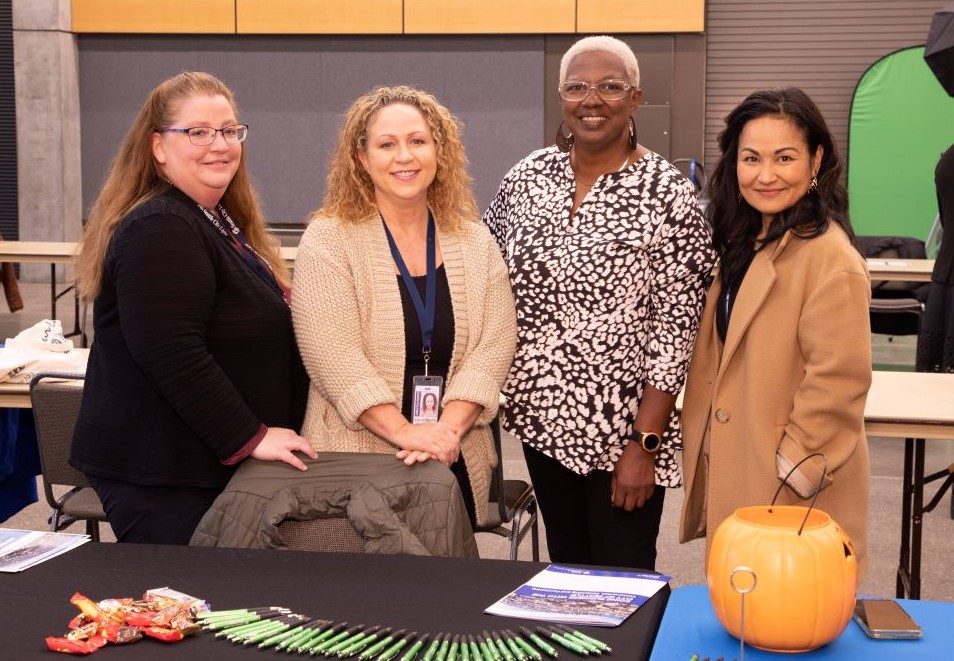 The Seattle City Light team at the Reverse Vendor Trade Show in November 2023 at Fischer Pavilion.
The Seattle City Light team at the Reverse Vendor Trade Show in November 2023 at Fischer Pavilion. Navigating bureaucratic processes can sometimes feel daunting, especially in the often complex world of contracting. But departments across the City of Seattle are working to make it easier for people to do business with the City. Take Seattle City Light, for instance.
The utility’s Procurement Unit has shifted its method of contracting for goods and services to a process called Expertise-Based Project Delivery or XPD. XPD improves the way scopes are written and eliminates much of the back and forth that tends to be part of the contracting process.

“I love the expertise-driven procurement; it weeds out the marketing fluff,” says City Light Contract and Procurement Manager Kim Rayray. “There’s a page limit so submissions are shorter. It is efficient, it saves time and it’s fair. And, parts of it are a blind-review process so bias is knocked out of the room.”
The process helps provide greater access and more opportunities for young businesses and women and minority-owned businesses (WMBE) firms and is part of a larger effort by the City to make contracting more equitable.
Seattle is the recipient of a $1 million Bloomberg Procurement Transformation Grant, a partnership between the Department of Finance and Administrative Services and the Mayor’s Innovation and Performance Team, with technical assistance from the Harvard Government Performance Lab. As part of our goal of elevating procurement as a strategic function of City government, the City is highlighting a multi-part series of stories that demonstrate Citywide promising practices that can better support our WMBEs.
The efforts underway at City Light are one such example.

SoundEarth Strategies, a self-certified MBE won a contract investigating and remediating substation properties for City Light under the XPD system. Geologist Ryan Bixby is a principal in the 23-year-old firm. While his firm has won several contracts with the City over the years, he said getting a foot in the door can be tricky for new companies and the new process removes bias and helps level the playing field.
“It allows firms that were not incumbent to win work,” he said.
Rayray says that means project managers can’t push for familiar vendors because the initial submissions have no letterhead or logo included and cannot mention specific projects. Project managers score the submissions before they know what company submitted the proposal.
“Sometimes they are surprised because the typical firms don’t do as well as they thought they would,” she said. “This has allowed different firms to get a seat at the table and even get projects they would not have normally gotten because well-known firms had a leg up.”
City Light looks to subject matter experts in the firms for particular projects and interviews them instead of company leaders.
“It’s like a conversation,” says Rayray. “We say, ‘Here’s this project, do you see any issues?’ They know this stuff. This is their field and you can clearly see if they understand your project. We know what we want. They tell us how to get there.”
Advantages of the XPD process include:
- 50% reduction in evaluation time
- Elimination of marketing “fluff” from proposals
- Attract the best vendors to compete on projects (actual individuals, not just the logo)
- Unique Pre-Award contracting mechanism to improve project risk management
- Project control tool to increase vendor accountability for project outcomes.
Rayray concedes it can be uncomfortable trying a fresh approach.
“But, that’s okay, I like to get uncomfortable. It’s the only way we grow,” she said.
And Ryan Bixby says it is just a matter of getting used to doing things a little differently.
“I think that the expertise-based structure will probably continue to make contracts more and more accessible to small firms,” he said.
About 80 of the almost 200 project managers at City Light are using the XPD method and the results are measurable.
City Light Procurement also plans trainings on proposal development to help WMBE vendors grow and build capacity. And Rayray is establishing a Center for Procurement Excellence chapter in the Pacific Northwest focusing on XPD.
Learn more about the Procurement Transformation project, and stay up to date by signing up for the Innovation & Performance newsletter and following @seattlefas on X. You can follow Seattle City Light on X @SEACityLight or check out the Power Lines blog.
Read more stories about promising practices in Seattle’s work to make City contracting more efficient, results-driven, equitable, and strategic: